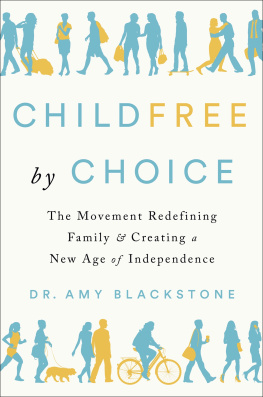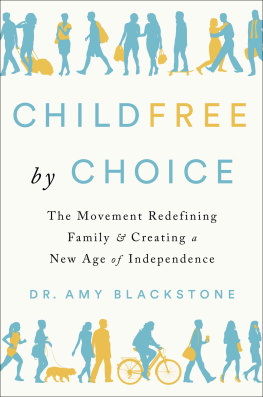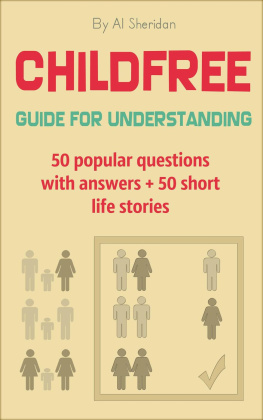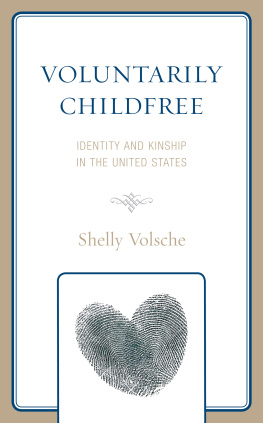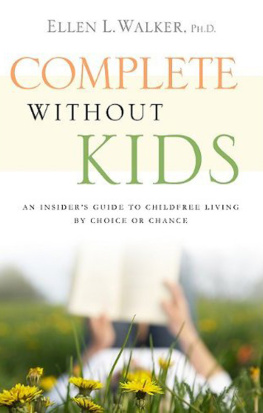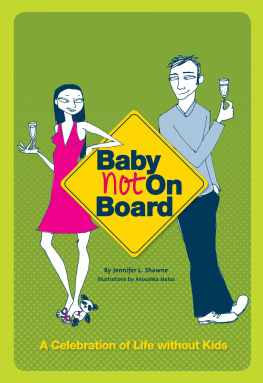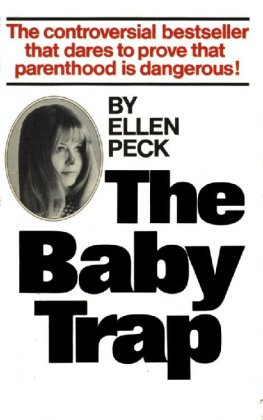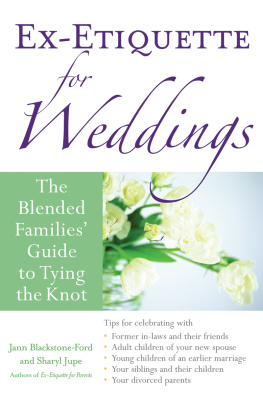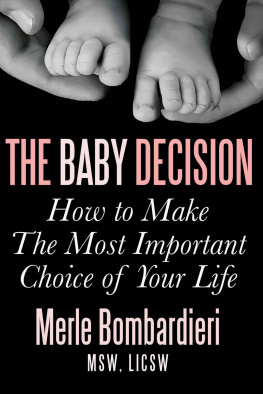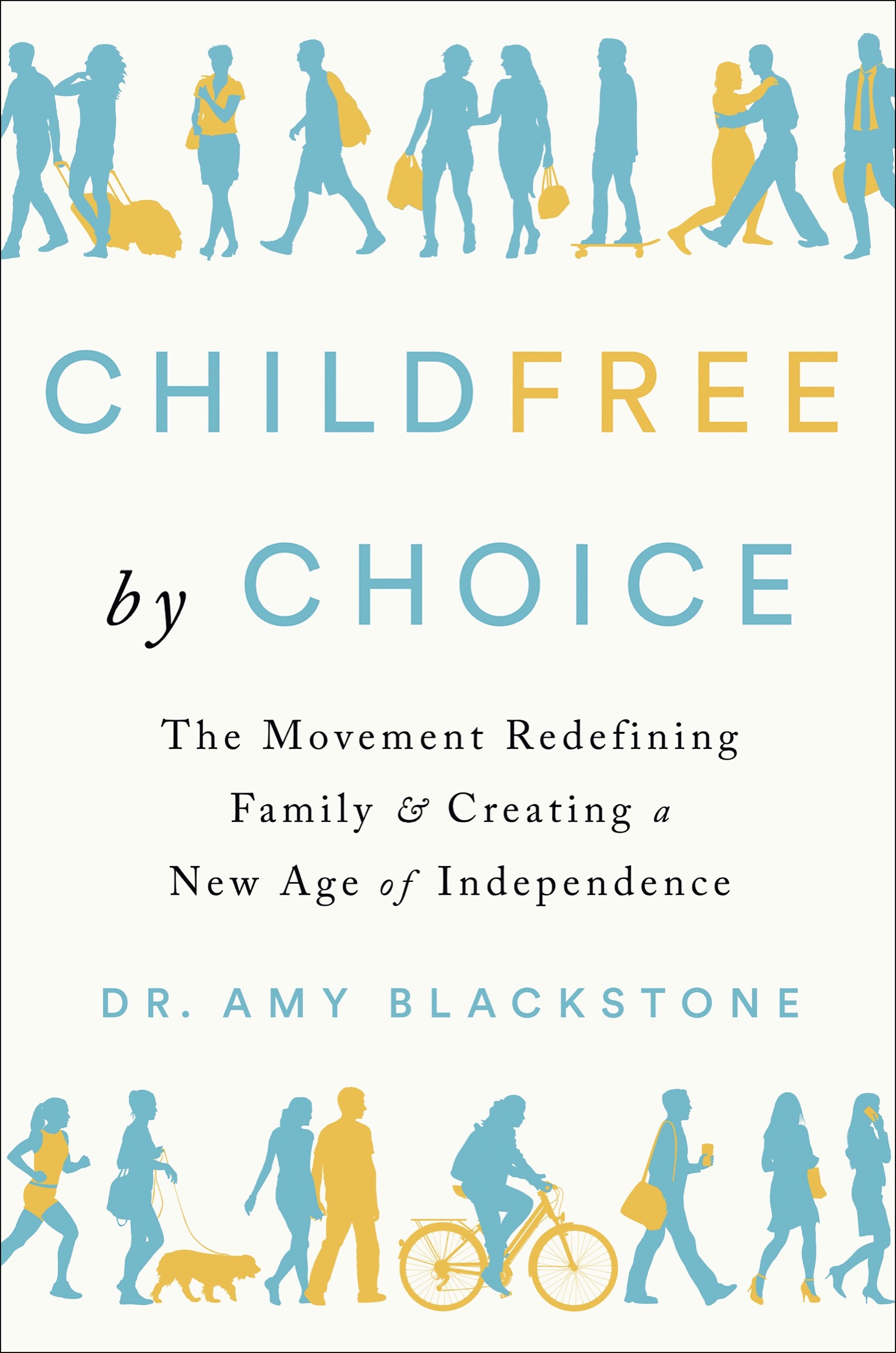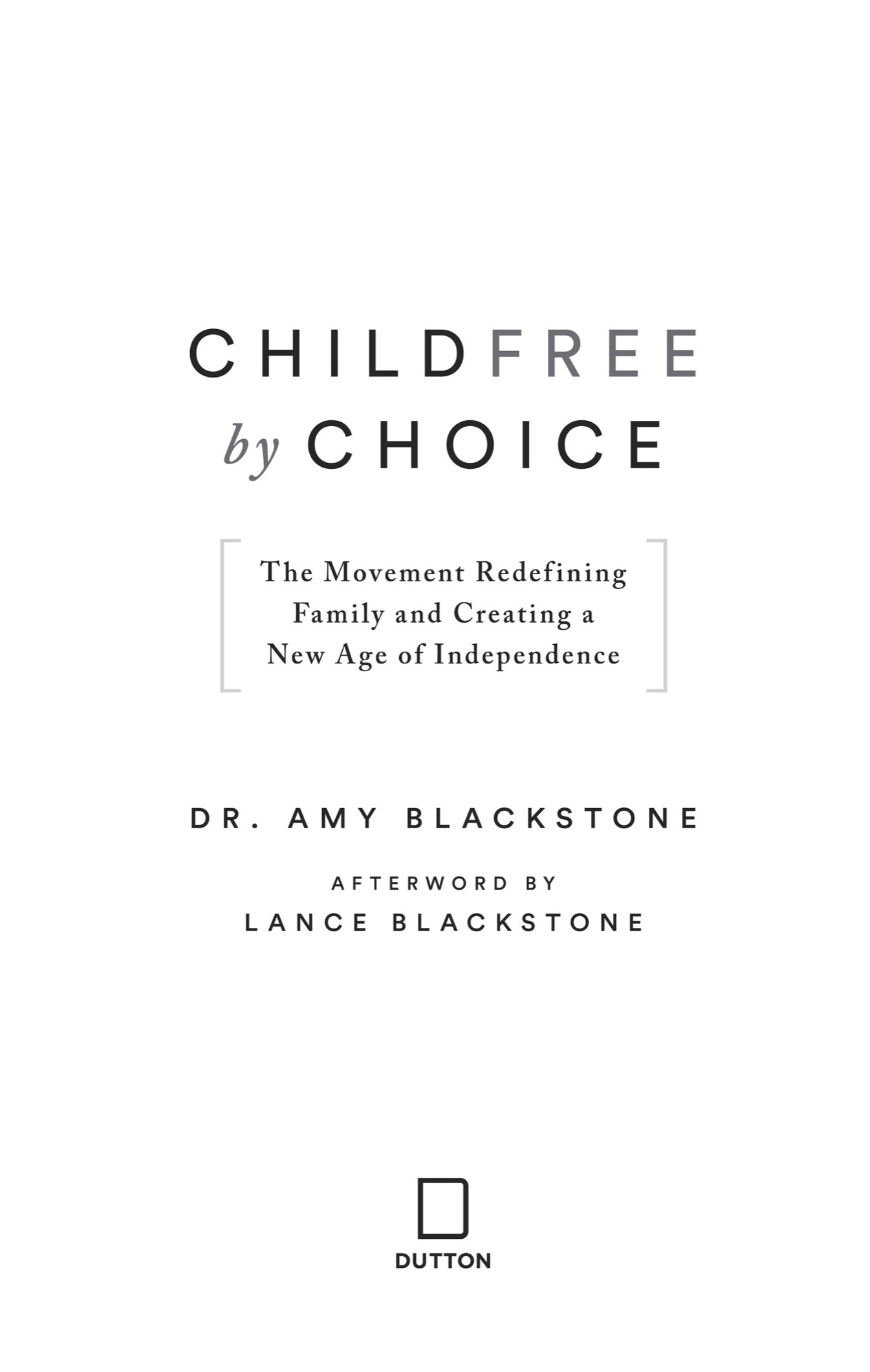Penguin supports copyright. Copyright fuels creativity, encourages diverse voices, promotes free speech, and creates a vibrant culture. Thank you for buying an authorized edition of this book and for complying with copyright laws by not reproducing, scanning, or distributing any part of it in any form without permission. You are supporting writers and allowing Penguin to continue to publish books for every reader.
DUTTON and the D colophon are registered trademarks of Penguin Random House LLC.
Names: Blackstone, Amy, author.
Title: Childfree by choice : the movement redefining family and creating a new age of independence / Dr. Amy Blackstone.
Description: First edition. | New York, New York : Dutton, [2019] | Includes bibliographical references.
Identifiers: LCCN 2018039378| ISBN 9781524744090 (hardcover) | ISBN 9781524744106 (ebook)
Subjects: LCSH: Childfree choice.
Classification: LCC HQ755.8 B583 2019 | DDC 306.874dc23 LC record available at https://lccn.loc.gov/2018039378
While the author has made every effort to provide accurate telephone numbers, internet addresses, and other contact information at the time of publication, neither the publisher nor the author assumes any responsibility for errors or for changes that occur after publication. Further, the publisher does not have any control over and does not assume any responsibility for author or third-party websites or their content.
All names and identifying characteristics have been changed to protect the privacy of the individuals involved.
INTRODUCTION
We threw the party for Js first birthday. When it came time for cake, our guest of honor, the smallest person in the room by a long shot, fittingly selected the largest slice. It sat undisturbed on his high chair tray for just a few seconds.
Soon J, his chair, the floor, and, as we like to retell it, the ceiling were covered in cake. By some miracle, Js pudgy arms had the reach of the construction cranes he would later become obsessed with as a toddler.
It was a mess. Encouraged by our laughter, J massaged the frosting into his face. We were happy to egg him on. PostJ cleanup wasnt our problem. That was his parents job.
As my nephew Js nanny for the first few months of his life, I brought a good deal of experience to the role. A certified babysitter since age eleven, I had prior experience as a nanny and a stint in high school as perhaps the youngest church nursery head of all time. All roads pointed toward the inevitability of parenthood for me. My husband, Lance, was sure of it.
Never mind that wed already agreed we werent having kids. Never mind that Lance had no plans to change his mind. He knew, one day, I would change mine. My biological clock would tick on. My maternal instinct would kick in. When the time came, Lance would silently mourn his freedom, accept it, and move on.
While Lance counted the days remaining until I changed my mind, I waited for the world to catch on to a simple truth: that not having kids is a perfectly acceptable life choice.
We hadnt fully come out as childfree yet, but wed told a few people we werent planning to have kids. The oh, youll change your minds were a dime a dozen. No one took us seriously.
It wasnt really a surprise, then, when my sister chirped, So when are you two going to give J a cousin? My impassioned retort brought the room to a halt: Never!
The last glob of frosting clinging to Js flailing paws hit the floor with a thud. The news was out. We were {not} having a baby!
While we knew that our decision not to have kids fell outside the path that others had envisioned for us, Lance and I had no idea when we made the choice that wed find ourselves discussing it on the set of Katie Courics talk show years later. Lance, one of very few publicly vocal childfree men, joined the audience. I took my seat on the stage along with Katie. I was there to be interviewed in my capacity as Dr. Amy Blackstone, professor of sociology at the University of Maine and a nationally recognized expert on the childfree choice. When I suggested during the interview that the notion of maternal instinct is a myth, Katies responseThis is blasphemy!made clear just how sacred a conviction I had challenged. But I hadnt just challenged a deeply rooted conviction, Id made visible a choice that for many, and even for myself for many years, had remained largely unseen.
AN INVISIBLE CHOICE
Sociologist of gender Judith Lorber once observed, Talking about gender for most people is the equivalent of fish talking about water.), not everyone becomes a parent.
In launching my research on the childfree, my goal was to better understand and make visible the experiences of people whose circumstances I didand doshare. At the time that I decided I wanted to study the childfree, I had just submitted my tenure portfolio and felt confident that the response would be positive. Upon reaching this milestone in my career, many of my friends were reaching a significant milestone in their own livesthey were, to use the common vernacular, starting their families. Even friends I once thought were sure to be part of our lifelong childfree sister- and brotherhood were having kids.
One friend, whod declared at her bridal shower years earlier (much to the chagrin of her mother and grandmothers) that she was never, ever having kids, called to tell me that she wasquite intentionally and very happilypregnant. Shortly thereafter, a friend from grad school, who had been on the fence about kids, shared her own good news. And though I am in no way superstitious, my friends pregnancies always seem to come in threes. A week after my grad school friend shared that she was expecting, a friend from work who I knew had been leaning toward not having kids, shared with me the news of her own pending bundle of joy. In all three cases, I was happy for my friends, genuinely so, because in spite of their earlier hesitation, I knew theyd made the choice they wanted to make. This isnt always the case for parentssomething Ill explore more in the following pages.
As someone without kids but who felt that I had started a familyId already built a life on my own as an adult with a household, a career, a cat, and a companionI was struck by the notion that my family didnt seem to count and that our friends, with whom Lance and I had once had so much in common, were disappearing. I also wondered what was wrong with me and where the batteries to my own biological clock had gone. Why wasnt I feeling the same pull toward motherhood that so many of the women around me seemed to be feeling?
So, as a newly tenured professor who was seeing less of her friends as they made the transition to parenthood and who now had a job from which I could not easily be fired, I decided to shift the focus of my research agenda to include a set of questions that I had a personal investment in, questions surrounding the childfree choice and the experience of being childfree. I launched what has become my decade-long study of the childfree after receiving a grant from the National Council on Family Relations section on Feminism and Family Studies. As a sociologist of gender at heart and by training, I focused the grant on discovering how gender and the childfree choice might be connected. Did women and men reach the decision in the same way? Did they think about their choice similarly? How did others respond? Were the consequences of their choice the same regardless of gender?

